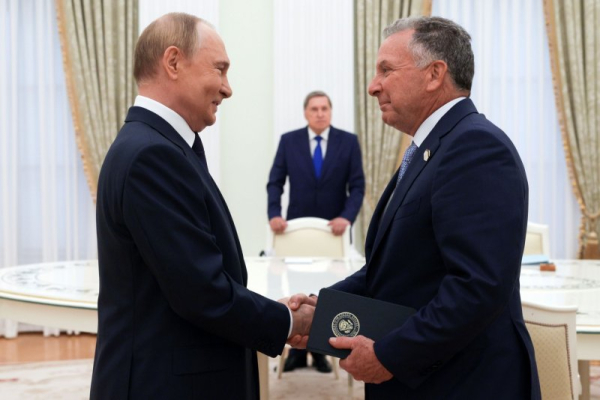

Russian President Vladimir Putin greets U.S. special envoy Steve Witkoff at the Kremlin in Moscow on Wednesday ahead of a face-to-face meeting. Photo by Gavrill Grigorov/Sputnik/Kremlin Pool/EPA
U.S. special envoy Steve Witkoff arrived in Moscow on Wednesday for eleventh-hour talks with the Russian officials ahead of an American deadline for Russia to agree a cease-fire with Ukraine set to expire on Friday.
Witkoff was met at Moscow’s Vnukovo Airport by Russian Direct Investment Fund Kirill Dmitriev, who leads the regime’s negotiating team, before traveling directly to the Kremlin to meet with Russian President Vladimir Putin.
Witkoff, who is on his fifth mission to Russia this year as the face of the Trump administration’s drive to end the war, also held face-to-face talks with Putin on the two most recent visits on April 11 and April 25.
The visit comes after U.S. President Donald Trump brought forward to Friday a 50-day deadline for Moscow to make a peace deal with Ukraine or face tough new economic sanctions in the form of 100% tariffs on trading partners who purchase Russian oil.
On Tuesday, Trump refused to prejudge the outcome of the negotiations, saying he would hold off on deciding whether to move ahead with the sanctions until the end of the talks.
“We have a meeting with Russia tomorrow. We’re going to see what happens. We’ll make that determination at that time,” he said at the White House.
Putin could seek to head off the sanctions by offering something less than the full cease-fire Trump has been pushing for, possibly halting the large-scale nightly aerial bombardment Russian forces have been raining down on Ukrainian cities and towns that started at the beginning of June.
Ukrainian President Volodymyr Zelensky said Tuesday that Russia was intensifying those attacks and welcomed the leverage being applied by the United States, saying everything else had failed.
“Not a single day has gone by without their terror against civilians. Not a single day have they given us real, complete silence on the frontline. And the root cause of this war is simply Russia’s desire to control the lives of its neighbors, to subjugate them, to kill them. If not for that, there would be no war,” he said in a post on X.
“It is extremely important that Moscow is beginning to feel the pressure of the world, the pressure from the United States, the threat of tougher sanctions for continuing the war.”
Speaking last week after drone and missile strikes on Kyiv killed 31 people and injured more than 150, Trump condemned the nightly attacks on Ukraine.
“I think it’s disgusting what they’re doing. I think what Russia is doing is very sad. I think it’s disgraceful. We’re going to put sanctions,” he said during a briefing at the White House on Thursday
However, he expressed doubt over the efficacy of sanctions on Russia, saying he didn’t know “that sanctions bother him [Putin]” because Russia’s leadership was used to them.
The latest developments came as Moscow upped rising nuclear tensions with the United States and Europe by announcing an end to a unilateral moratorium on the development of short and medium-range nuclear missiles.
The Russian Defense Ministry said steps toward the deployment of U.S.-made ground-launched Intermediate-Range Nuclear Forces missiles in Europe and the Asia-Pacific meant the rationale for maintaining a unilateral moratorium on similar weapons had “ceased to exist.”
Monday’s announcement came three days after Trump repositioned two nuclear submarines closer to Russia in response to a “highly provocative” comment by former Russian President Dmitry Medvedev, saying that Trump’s sanctions ultimatum brought war between Russia and the United States a step closer.